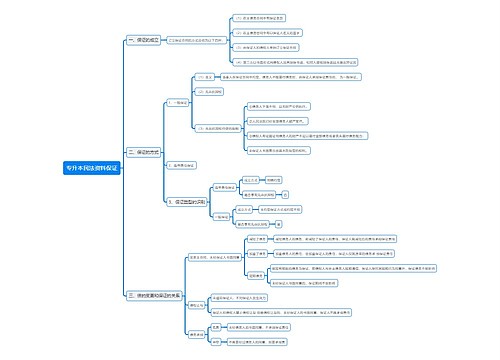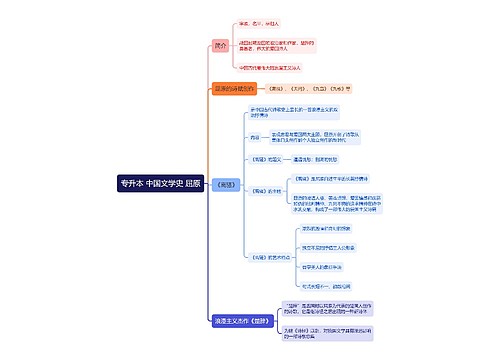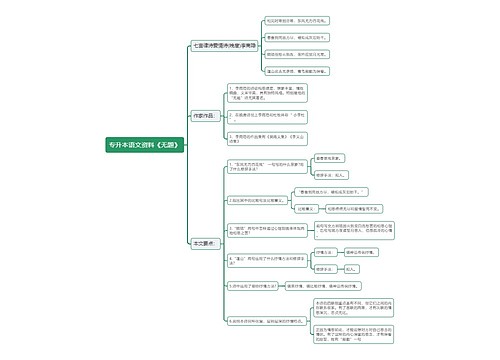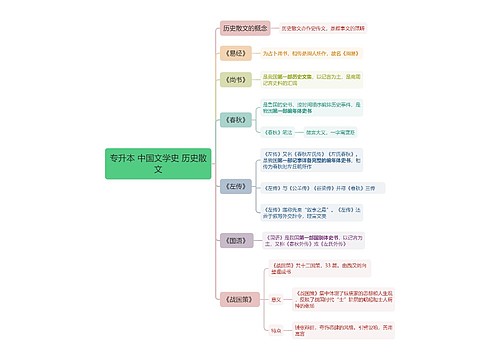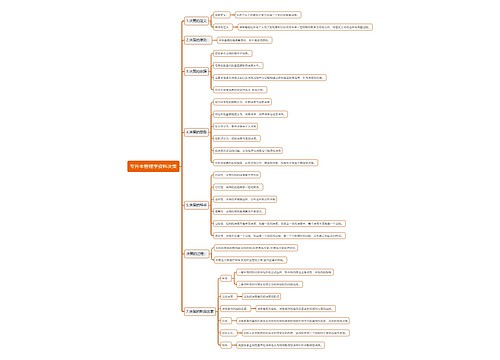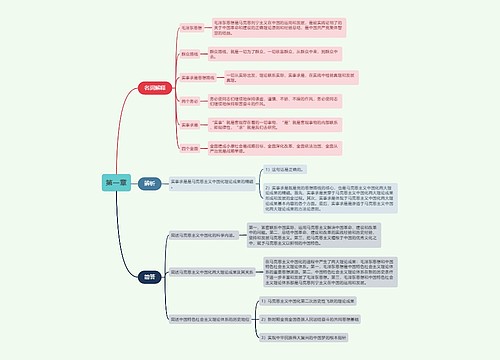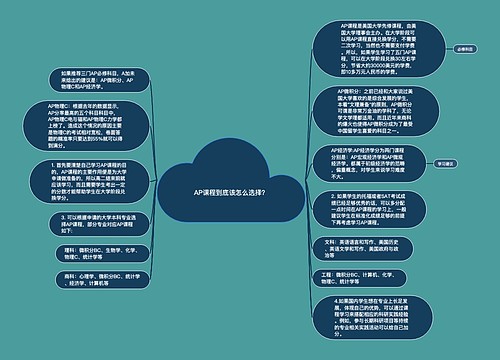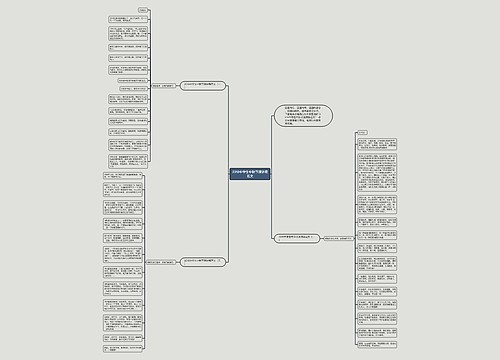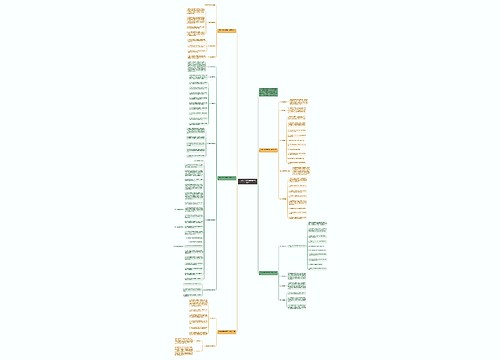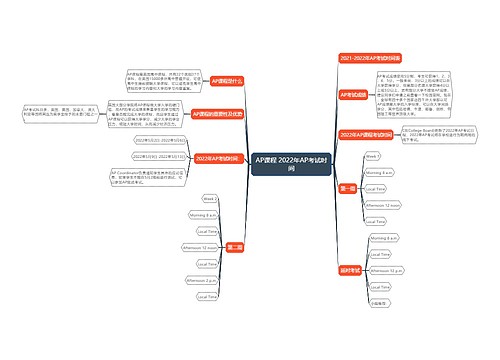
统招专升本英语重点词义辨析(下)思维导图
当居者的迷
2023-04-23

四川统招专升本
统招专升本英语重点词义辨析(下)
树图思维导图提供《统招专升本英语重点词义辨析(下)》在线思维导图免费制作,点击“编辑”按钮,可对《统招专升本英语重点词义辨析(下)》进行在线思维导图编辑,本思维导图属于思维导图模板主题,文件编号是:4cc05e25bc937da5584b7f5207410b2c
思维导图大纲
相关思维导图模版
统招专升本英语重点词义辨析(下)思维导图模板大纲
上一篇为大家整理了统招专升本英语重点词义辨析(上)的内容,此次专升本社区树图网为大家带来了统招专升本英语重点词义辨析(下)的内容,详情如下:
26. besides,except
(1)besides与except用于肯定句时,except意为"除……之外(不再有)";besides意为"除……之外(还有)"。
试比较:
I have another blue pen besides this one.
除了这枝外,我还有另一枝蓝色钢笔。(共2枝)
We all passed the exam except Tom.
我们都通过了考试,汤姆除外。(整体中……汤姆一人不及格)
(2)except前几乎总有all、any、every、no及其复合词等词。
He answered all the questions except the last one.
除了最后一个问题没答外,其余问题他都答了。
(3)except后接名词、代词、动名词和原形动词,这时except=but;但except后跟副词、介词短语时,不能用but代替。
如:The window is never open except in summer.
这扇窗户从来不开,除夏季外。
He did nothing except/ but clean the house.
他只是打扫了房子。
27. by the way,on the way,in the way
(1)by the way 常用作状语,意为"顺便问一下","顺便说一下"。
By the way, how old are you?
顺便问一下,你多大了?
(2)on the way "在……的路上",后接名词时需加介词to,后接副词home、here、there时不加to。
如:He bought a pen on his/ the way to school.
他在上学的路上买了一枝钢笔。
(3)in the way "挡路、妨碍"。
如:Your car is in the way.
你的小汽车挡路了。
28. get,turn,grow,become,be
这五个词作连系动词,都有"变化"的意思。
(1)get较口语化,表示进入或变成某种状态,通常与形容词或形容词比较级连用,表状态。
如:The days get shorter and shorter.
日子变短了。
(2)turn 有"成为和以前完全不同的东西"的含义,后接形容词或过去分词。
如:The trees turn green in spring.
在春天,树变绿了。
(3)grow表示逐渐变为新的状态的含义、着重变化过程。
如:My little brother is growing tall.
我的小弟弟长高了。
(4)become用法较为正式,强调由一种状态向另一种状态的变化。后接形容词或名词。
如:He has become a doctor.
他成为一个医生了。
(5)be表示"成为"的意思,多用于将来时,祈使语气或不定式。
如:I want to be a teacher when I grow up.
长大后我想成为一名教师。
29. hard,hardly
(1)hard adj. adv. 作形容词时,有"难的","硬的"意思,作副词时,有"努力地"、"猛烈地"等意思。
如:We must work hard for our country.
我们必须为祖国努力学习。
It rained hard yesterday.
昨天雨下得很大。
(2) hardly adv. "简直不"、"几乎不",在句中起否定作用。
如:I could hardly write at that time.
那时我几乎不会写字。
30. hear,hear of,hear from
(1)hear 为及物动词,"听到",表结果。
如:I can hear you clearly.
我能清楚听到你说的话。
(2)hear of = hear about 为不及物动词,指某人间接地"听别人说起……",
如:I have heard of the writer but I have never seen him.
我听人们说起这位作家,但没见过他。
(3)hear from 一般后接 sb. 指"收到……来信"。
如:Have you heard from Jim?
你收到吉姆的来信了吗?
31. join,join in,take part in
这三个词组在汉语中都表示"参加",但在英语使用中是有区别的:
(1)join通常指参加某种固定的组织、团队、军队等,强调成为其中一员。
如:He joined the party in 1927.
他1927年入党。
(2)join sb. (in) doing sth."和某人一起干某事"。
如:Why not join us in buying Susan gift?
为什么不和我们一起去给苏珊买礼物呢?
(3)join表示"参加某项活动"时,和take part in 可换用,但前者侧重娱乐、欣赏,而后者更侧重身体力行,参加在其中。
如:She has never joined/ taken part in such an interesting game.
她从未参加过这么有趣的游戏。
(4)take part in 指参加各种活动,包括文娱、体育、比赛、斗争、罢工等。
如:Are you going to take part in/ join in the discussion?
你要参加讨论吗?
32. look,see,watch,notice,read
这五个词都有"看"的意思,但用法不同
(1)look为不及物动词,一般后接介词at使用,表动作。
如:Please look at the blackboard.
请看黑板。
(2)see 指人肉眼所能涉及的范围,表示结果"看见"。
如:Can you see the word clearly?
你能清楚看到这个字了吗?
固定短语:see a film; see sb. off (给某人送行);let me see.
(3)watch= look at sb./ sth. carefully"仔细观看,注视"。
如:May I watch TV now?
我现在可以看电视吗?
固定短语:
watch TV; on watch(值班、守望);
watch a football match
(4)notice"注意到,提醒别人注意"等意思,汉语中常有"通知、启示、告示"之意。
如:The thief looked around the house.When he made sure that no one was noticing him,he jumped into the room through the open window.
小偷向房子四周张望,当他确信没人注意他的时候,迅速从开着的窗户跳进房间。
(5)read 只用于指看书或看其他杂志
33. on,about
这两个介词引导的介词短语一般作后置定语,表示"关于"的意思,但各有侧重。
(1)on 侧重论述,多用与论述涉及比较深广的重大国际、政治、学术、专著等问题。如:
如:This is a book on the radio.
这是一本关于无线电方面的专著。
(2)about侧重叙事,多用与个人事迹,故事内容一般的文章等较肤浅的问题。
如:This is a book about the radio.
这是一本关于无线电的书。
34. problem,question,matter
(1)problem多指"习题,问题",通常也指要解决或决定的问题,
尤其指比较困难的问题、社会问题。
如:He is thinking about a maths problem.
他正在想一道数学难题。
(2)question 常指由于对某事感到疑惑不解而提出需要解答的问题,常与ask和answer连用。
如:May I ask a question?
我可以问个问题吗?
(3)matter意为"事情"、"问题",常指遇到意外的麻烦或令人烦恼的"问题"
如:What's the matter with you?
你怎么啦?
35. receive,accept
这两个词都是及物动词,表示"接到、收到"的意思,但有区别:
(1)receive强调"收到、接到"这一动作。
如:I received a letter yesterday.
昨天我收到了一封信。
(2)accept强调立场上的结果,表"领受、接受"意义。
如:I received his gift but I didn't accept it.
我收到了他的礼物,但我没有接受它。
36. so that,so…that
(1)so that"以便"、"为了",常引导目的状语从句。
如:He got up early so that he could catch the first bus.
他起得早为了赶第一班车。
so that所引导的状语从句中谓语动词前一般有情态助动词can/may等。
(2) so…that"如此……以至……",that 后常跟结果状语从句。
如:He is so tired that he can't walk any further.
他非常疲劳,走不动了。
37. very,quite,rather,too
这四个词都是副词,表示"很、十分"之意。
(1)very没有褒贬之义,中性词。
very good/ bad/ beautiful;
(2)quite带有褒义,有"赞扬、赞美"之意。
quite good/ well;
(3)rather 带有贬义,有"批评"、"鄙视"之意。
rather fat/ bad;
(4)too也带有贬义,在这些词中程度最大,有"过于"、"太……"。
如:too noisy 太噪,too fat 太胖。
38. whether,if
这两个词都作"是否"解,引导宾语从句时,二者可互换。
如:People often ask me whether/ if I like football.
人们常问我是否喜欢足球。
但在下列情况中不能用if, 只能用whether。
(1)当whether与or not连成一个词组时。
如:I don't know whether or not he would come for our help.
我不知道他是否来帮助我们。
(2)whether 引导的(主语)从句放在句首时。
如:Whether this is right or not, I can't say.
这事对与不对,我说不准。
Whether you will go is none of my business.
你是否要去与我无关。
(3)whether + to do sth. 复合结构,可以作宾语。
如:He hasn't decided whether to go or not.
他没有决定是否要去。
39. in hospital, in the hospital
在英国,in hospital 是"住院"的意思,hospital 具有抽象化的涵义,不指某个具体的医院,故前面不用冠词。
如:He is ill in hospital.
他生病住院了。
in the hospital 意为"在医院", 在这里,hospital 指一家具体的医院。
如:In the hospital, the woman finds her husband.
在医院里,那位妇女找到了她的丈夫。
40. worth, worthy
(1)worth 表示"值"、"相等于…的价值"。表示"价值…"的意思时,常与表示钱方面的名词连用;表示"值得…"的意思时,常与名词连用。它一般用作表语。
常用下面两种句型:
sth+ be worth + 动名词或名词,
It + be worth (one's) while + 动名词(或不定式)。
如:The city is well worth visiting twice.
这个城市很值得再去看看。
(2)worthy 作"值得"、"应……的"、"足以……"解。用作形容词时,表示对某事有资格或合适的意思,通常作表语用。后接of短语或不定式。它还可表示可尊敬的,有价值的等到意思,用作定语。
如:She is worthy of praise.= She is worth praise.
她值得表扬。
41. alive, living, live
这三个形容词都表示"活着的、有生命的",但在使用的范围和场合上有差异。
alive 是表语形容词。用用"活着"解时,通常用于人,很少用于物或比喻场合。此外,alive还可表示"有生气的、活泼的"。
在be alive with短语中,表示"(某处)充满……"。
如:The child was found alive by the roadside.
人们在路边发现这孩子活着。
living 既可作表语又可作定语,可用于人也可用于物或比喻场合。
如:Of all living writers, I admire Mr. Shaw most.
在所有作家中,我钦佩萧先生。
live 仅作定语,除在诙谐的场合用于人外,主要用于动物和无生命的东西。
如:a live mouse, live coal, a live wire (带电的电线),a live programme(实况节目)等。
如:This morning I bought some live fish from the market.
今天早晨我在市场买了几条活鱼。
42. good, well, nice
这三个词都表示"好"的意思,但它们在词性和修饰的对象方面有所不同。
good, "好",是形容词用来修饰名词,
如:good news好消息;good points优点;a good year好年成。
如:She is a good singer.
她是一个好歌手。
well, "好、令人满意地",是副词,用来修饰动词,
如:well done干得好,live well生活得好。
如:Kate doesn't sing well, but she dances well.
凯特唱不好,但她舞跳得很好。
表示身体健康要用well不用good, 这时well是形容词。
如:I'm feeling very well today. 我今天感觉身体很好。
nice,"好的","好看的",是形容词,用来修饰名词。在表示"好"的含义与good不一样。
如:a nice girl一个好看的姑娘;nice weather好天气。nice 也可以表示"愉快的", 但在修饰程度上与good不一样。
如:He was very nice to me.
他对我真好。
43. clothes, cloth, clothing
clothes 统指各种衣服,谓语动词永远是复数;
cloth 指布,为不可数名词;
clothing是服装的总称。
44. incident, accident
incident 指小事件;
accident 指不幸的事故。
如:He was killed in the accident.
他在意外中不幸被杀。
45. amount, number
amount of 后接不可数名词;
a number of 后接可数名词
如:amount of money;a number of students
46. family, house, home
home指家,包括住处和家人;
house 房子,住宅;
family 家庭成员。
如:My family is a happy one.
47. population, people
population 指人口,人数;
people 指具体的人。
如:China has a large population.
中国人口众多。
48. weather, climate
weather指一天内具体的天气状况;
climate指长期的气候状况。
如:The climate here is not good for you.
这里的气候不太适合你。
49. work, job
二者均指工作。
work指无差别的人类劳动,不可数;
job指具体某一项工作,可数,a good job。
50.trip, journey, travel, voyage
travel 是最常用的,指旅行或普通出行;
trip 指短期的具有特定目的的旅行;
journey 指稍长的旅途;
voyage 指海上航行。
查看更多
抓住重点思维导图
 ~漫埗陽茪~
~漫埗陽茪~树图思维导图提供《抓住重点》在线思维导图免费制作,点击“编辑”按钮,可对《抓住重点》进行在线思维导图编辑,本思维导图属于思维导图模板主题,文件编号是:4c49e4799ddf94a339c56e46eb96a826
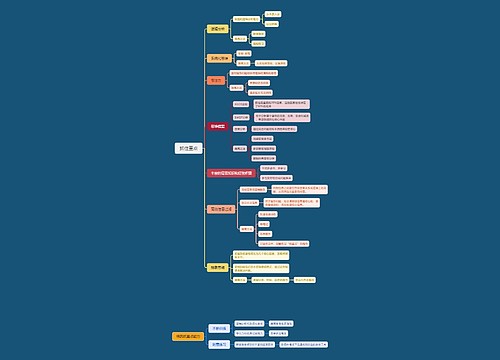
——重点行业机构业务客户生态图谱(锦州地区)思维导图
 U481330656
U481330656树图思维导图提供《——重点行业机构业务客户生态图谱(锦州地区)》在线思维导图免费制作,点击“编辑”按钮,可对《——重点行业机构业务客户生态图谱(锦州地区)》进行在线思维导图编辑,本思维导图属于思维导图模板主题,文件编号是:f930058a554a09639a5c5c0e168c451c
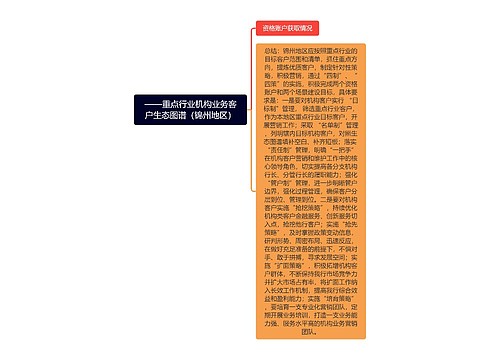
相似思维导图模版
首页
我的文件
我的团队
个人中心
